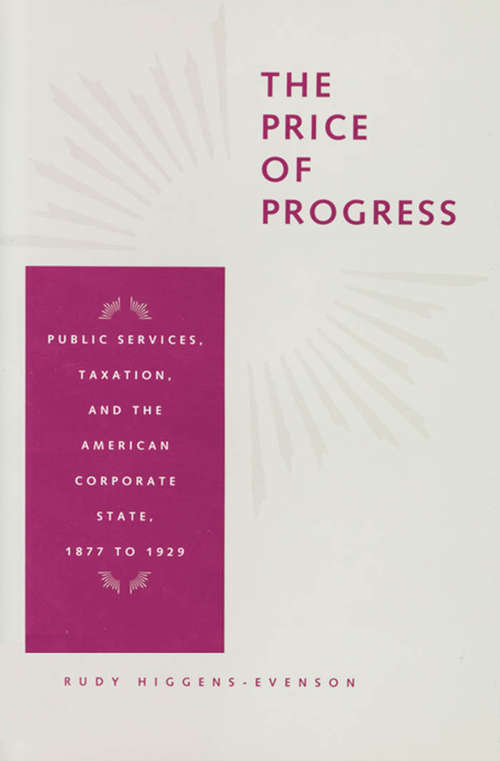The Price of Progress: Public Services, Taxation, and the American Corporate State, 1877 to 1929 (Reconfiguring American Political History)
By:
Sign Up Now!
Already a Member? Log In
You must be logged into Bookshare to access this title.
Learn about membership options,
or view our freely available titles.
- Synopsis
- Between the Civil War and the Great Depression, twin revolutions swept through American business and government. In business, large corporations came to dominate entire sectors and markets. In government, new services and agencies, especially at the city and state levels, sprang up to ameliorate a broad spectrum of social problems. In The Price of Progress, R. Rudy Higgens-Evenson offers a fresh analysis of therelationship between those two revolutions. Using previously unexploited data from the annual reports of state treasurers and comptrollers, he provides a detailed, empirical assessment of the goods and services provided to citizens, as well as the resources extracted from them, by state governments during the Gilded Age and Progressive Era.Focusing on New York, Massachusetts, California, and Kansas, but including data on 13 other states, his comparative study suggests that the "corporate state" originated in tax policies designed to finance new and innovative government services.Business and government grew together in a surprising and complex fashion. In the late nineteenth century, services such as mental health care for the needy and free elementary education for all children created new strains on the states' old property tax systems. In order to pay for newly constructed state asylums and schools, states experimented for the first time with corporate taxation as a source of revenue, linking state revenues to the profitability of industries such as railroads and utilities. To control their tax bills, big businessesintensified lobbying efforts in state legislatures, captured important positions in state tax bureaus, and sponsored a variety of government-efficiency reform organizations. The unintended result of corporate taxation—imposed to allow states to fulfill their responsibilities to their citizens—was the creation of increasingly intimate ties between politicians, bureaucrats, corporate leaders, and progressive citizens. By the 1920s, a variety of "corporate states" had proliferated across the nation, each shaped by a particular mix of taxation and public services, each offering a case study in how the business of America, as President Calvin Coolidge put it, became business.
- Copyright:
- 2003
Book Details
- Book Quality:
- Publisher Quality
- Book Size:
- 184 Pages
- ISBN-13:
- 9780801875892
- Related ISBNs:
- 9780801870545
- Publisher:
- Johns Hopkins University Press
- Date of Addition:
- 08/31/21
- Copyrighted By:
- The Johns Hopkins University Press
- Adult content:
- No
- Language:
- English
- Has Image Descriptions:
- No
- Categories:
- History, Nonfiction, Business and Finance, Politics and Government
- Submitted By:
- Bookshare Staff
- Usage Restrictions:
- This is a copyrighted book.
Reviews
Other Books
- by R. Rudy Higgens-Evenson
- in History
- in Nonfiction
- in Business and Finance
- in Politics and Government
